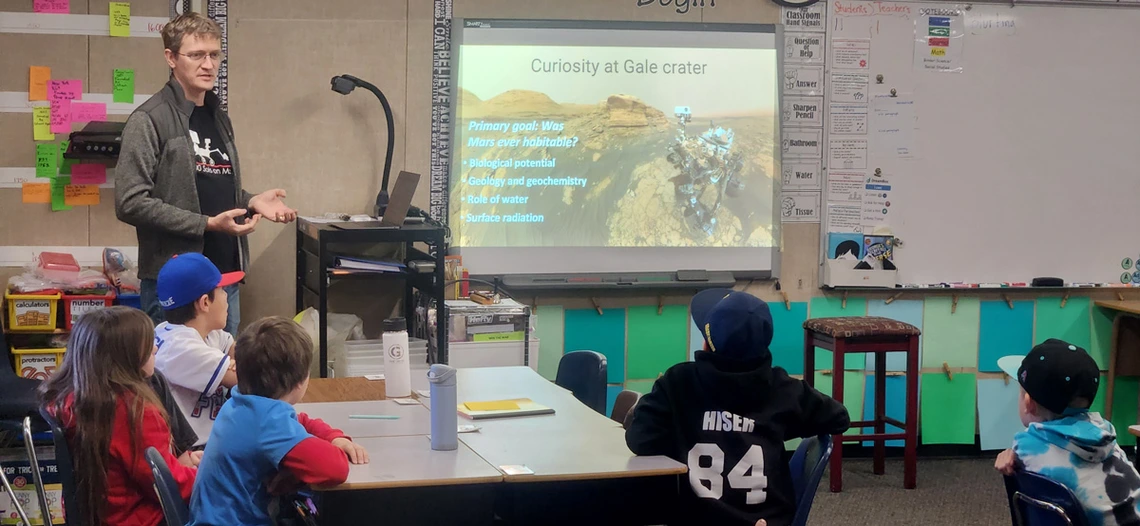Water on Mars

Image: Dr. Ryan Anderson presenting to students at FUSD Knoles Elementary
To investigate connections between landforms on Mars to landforms on Earth, APW travels far into water education topics. Through a partnership with Flagstaff’s STEM City Full STEAM Ahead (FSA) program, APW is engaged in a year-long initiative with FUSD’s Shauna Cooper of Knoles Elementary to deepen science instruction in her fifth-grade classroom. To support the class's current unit on space science (and keep water education at the forefront), APW adapted a lesson from NASA that inspires curiosity and discovery using 3D models, utilized the NASA-funded NAU PLANETS activities, and brought a very special planetary scientist into the classroom!
“Water on Mars?” is a special lesson intended to spark curiosity. What do you already know about Earth’s landforms? What about Mars? Is there water on Mars? During the initial landform lesson, the class discussed the shaping of the planets by erosion, comparing water-shaped landforms on Earth to water-shaped landforms on Mars. The lesson also presented the tools used, such as remote sensing photos, earth satellite photos, models, core samples, and maps. Students brought the lesson home and compared a River Valley on Mars to the Rio de Flag, which runs adjacent to the school grounds.
Students researched water features and landforms on Earth while using their own 3D models. They explored erosion by water and wind and created their own river channels, alluvial fans, deltas, canyons, and streams. Students then compared Earth’s features to similar features discovered from remote sensing imagery on Mars, and surveyed images of features that appeared to be eroded by water flow, such as drainage networks and past floods.
The students had many questions, and thanks to our strong community STEM network, Anne Hamlin of NAU’s Center for Science Teaching and Learning and co-creator of PLANETS referred us to a special guest planetary scientist to help answer those questions. The class welcomed Ryan Anderson, PhD, who is a planetary scientist in the US Geological Survey Astrogeology Science Center and a science team member on the Curiosity and Perseverance Mars rover missions, to speak with the curious students!
During Dr. Anderson's presentation, students asked about the average days on Mars, the average temperature, what the atmosphere was like, and how tall Mars’ volcanoes were. They were curious about the distance traveled and if water was still flowing on Mars.
Other questions included how the rover survives upon impact, and Dr. Anderson explained that the rover is constructed to project the location and path of landing, along with the weight and impact. Dr. Anderson offered great photography in his presentation, with images of the Martian surface and a video of the Curiosity rover landing.
The students made strong connections between the APW Water on Mars lesson and Dr. Anderson’s presentation. Students recalled our geology inquiries and connected to Dr. Anderson's lessons regarding the surface of soil and how scientists date the radioactive decay of rocks to determine the age of Mars. They learned about Mars craters and how the Curiosity rover navigates the craters. Students learned that there is vapor in the atmosphere that forms clouds and there is evidence of snow on Mars! What are you curious about?
For more information on the PLANETS STEM Activities: https://planets-stem.org/planets-at-home/
Image: Dr. Ryan Anderson presenting to students at FUSD Knoles Elementary

